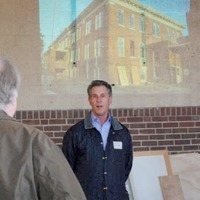 Richard E. Dover and Family Pride Corporation have been passionate about historic preservation since the company was created in 1993. Richard E. Dover has been deeply involved with saving historic structures in Tennessee, North Carolina and Florida. According to Richard E. Dover, his quest to improve and preserve historic structures still continues. Here, Richard E. Dover describes the importance and the process of restoration.
Richard E. Dover and Family Pride Corporation have been passionate about historic preservation since the company was created in 1993. Richard E. Dover has been deeply involved with saving historic structures in Tennessee, North Carolina and Florida. According to Richard E. Dover, his quest to improve and preserve historic structures still continues. Here, Richard E. Dover describes the importance and the process of restoration.
A Gathering of Experts: Thank you for being here today, Mr. Richard E. Dover.
Richard E. Dover: Thanks for having me.
A Gathering of Experts: As an expert in restoration, can you explain what historic restoration is exactly?
Richard E. Dover: Restoration is a process where a building of historic value is restored to its original beauty. Precise attention to detail must be given and using original building materials is imperative.
A Gathering of Experts: Can you explain the restoration process?
Richard E. Dover: The process falls into four different categories. A historic building can be preserved, restored, rehabilitated or reconstructed.
A Gathering of Experts: How does rehabilitation differ from reconstruction?
Richard E. Dover: Rehabilitation requires alteration to the basic structure with current building materials so that it can continue to be useful for modern-day purposes. Every attempt is made, however, to preserve the original look of the building. Reconstruction, on the other hand, involves repairing buildings that have collapsed or been damaged, and asks for new construction materials as long as they are similar to the original ones.
A Gathering of Experts: Which process is the least labor-intensive?
Richard E. Dover: Preservation is most likely the least labor intensive as it involves preventing physical deterioration without removing the natural effects of history and character.
A Gathering of Experts: Is the restoration process difficult?
Richard E. Dover: I call the process an exciting challenge. It can be expensive and time-consuming. It’s important to surround yourself with professionals who can assist with every phase of the project, such as architects, historians, contractors, suppliers, as well as researchers and preservationists.
A Gathering of Experts: How do you start the restoration process?
Richard E. Dover: Before I buy a historic building, I thoroughly inspect it to determine the condition. I carefully map out what I want to accomplish and budget how much money I can afford to spend. The next step is research. The more you know about the building, the more accurate the restoration will be.
A Gathering of Experts: Why is historical restoration important?
Richard E. Dover: History contributes to the personality of a community. It gives it its unique character. Historic preservation involves more than simply saving and restoring old buildings. There are economic, cultural and environmental considerations as well.
A Gathering of Experts: How does the economy benefit from historic restoration?
Richard E. Dover: Preservation creates jobs since the projects are more labor intensive. Another important economic benefit is tourism. Many people have a deep fascination with sites where history happened. Heritage tourism provides billions for the hospitality and travel industries.
A Gathering of Experts: What types of buildings are usually targeted for restoration?
Richard E. Dover: The structures are generally at least 50 years old and usually represent an architectural era, such as Victorian or Tudor design.
A Gathering of Experts: What is a definite “no-no” when restoring buildings?
Richard E. Dover: You cannot destroy distinctive original features. Also, avoid sandblasting and other damaging methods.
A Gathering of Experts: What advice would you give to a first-time preservationist?
Richard E. Dover: Protect, preserve and respect the building and the changes that have taken place over time. Repair rather than replace.
Richard E. Dover is involved in a number of projects spanning from Knoxville to Oak Ridge. Richard E. Dover currently oversees the restoration of the historic Alexander Inn. The historic former inn will become an assisted living center for seniors, according to Richard E. Dover.
